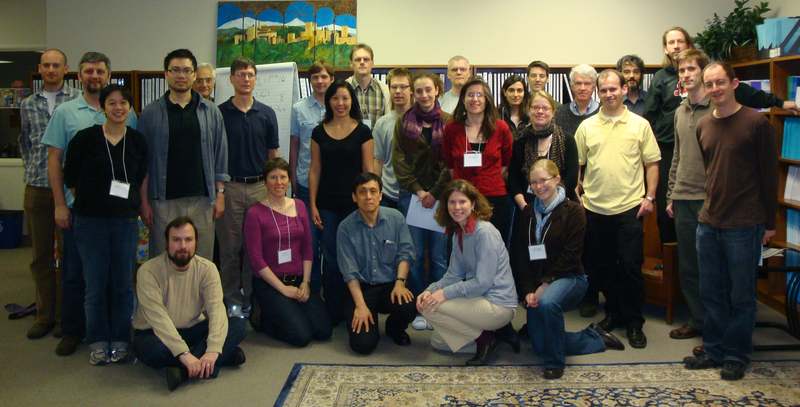Localization techniques in equivariant cohomology
March 15 to March 19, 2010
at the
American Institute of Mathematics,
San Jose, California
organized by
William Fulton,
Rebecca Goldin,
and Julianna Tymoczko
Original Announcement
This workshop will be devoted to localization techniques in equivariant cohomology. Localization techniques in equivariant cohomology are a powerful tool in computational algebraic topology in the context of a topological space with the action of a Lie group. The development of these techniques has led to an explosion of research, including groundbreaking work in many different fields, especially algebraic combinatorics, algebraic geometry, symplectic geometry, and algebraic topology.
The goal of this conference is to relate the geometric and combinatorial
aspects of what has been dubbed ''GKM'' theory by bringing researchers from combinatorics and
geometry/topology together, so that workers in each of these fields can
benefit from the insights and experience of those in the other. The
conference will address open questions such as the following:
- Can the combinatorial techniques of GKM theory be extended to a wider
class of spaces, even if the image of the inclusion map cannot be described?
These families could include singular spaces, infinite dimensional spaces,
stacky spaces (including Deligne-Mumford stacks), and spaces with specific
kinds of group actions or geometric structures.
- For what larger class of manifolds than $G/P$ does the Kostant program
extend? Resolving this would entail finding geometric reasons behind the
combinatorial rules in $G/P$. What specific kinds of group actions or
geometric structure would be required? Answering this question would allow
us to apply these powerful combinatorial techniques to reveal geometric and
algebraic structure (such as intersections and cohomology rings of all
types) in a much broader context.
- Can the techniques of GKM theory be used to prove combinatorially
positive results in Schubert calculus or its generalization in an
appropriate geometric setting? A combinatorially positive result interprets
structure constants in the cohomology ring as the cardinality of a set; an
answer to this question might generalize combinatorial objects such as puzzles, cartons, or tableaux to an algorithm that counts paths within graphs, and give closed positive formulas for structure constants in an equivariant cohomology ring.
This conference will gather researchers from each of the main approaches to
equivariant cohomology: algebraic geometry, symplectic geometry, algebraic
topology, and algebraic combinatorics.
Material from the workshop
A list of participants.
The workshop schedule.
A report on the workshop activities.
Papers arising from the workshop:

